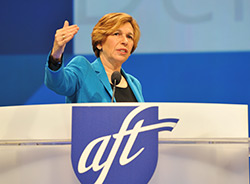AFT on Senate HELP Committee Action on ESEA Reauthorization Bill

"This is a big deal, an important step forward and the most positive development we've seen in public education policy in years—because of both its content and the committee's very intentional move to leave partisanship at the door."
WASHINGTON—Statement by American Federation of Teachers President Randi Weingarten on markup by the Senate Health, Education, Labor and Pensions Committee on the Elementary and Secondary Education Act reauthorization bill, known as the Every Child Achieves Act:
"This is a big deal, an important step forward and the most positive development we've seen in public education policy in years—because of both its content and the committee's very intentional move to leave partisanship at the door. This bill rebalances the federal role in America's schools: While not perfect—no compromise is—it restores the law's original intent to address poverty and educational inequality with targeted funding for poor children. It moves away from the counterproductive focus on sanctions and high-stakes tests, and ends federalized teacher evaluations and school closings.
"In ESEA's first 25 years, when high-poverty schools received targeted funding for resources, the achievement gap narrowed measurably. And while our public schools continue to make strides, NCLB, Race to the Top and waivers to the law allowed high-stakes testing to eclipse all else, yielding minimal progress in addressing the achievement gap. They also diminished creativity and joy in schools; dampened the ability to recruit and retain great teachers in hard-to-staff schools; and spawned enormous frustration for parents, students and educators. What helps our public schools really succeed is not an obsession with test scores but giving students the resources and interventions they need to climb the ladder of opportunity, and giving teachers the supports and resources they need to do their jobs well."
# # # #
The AFT represents 1.6 million pre-K through 12th-grade teachers; paraprofessionals and other school-related personnel; higher education faculty and professional staff; federal, state and local government employees; nurses and healthcare workers; and early childhood educators.
